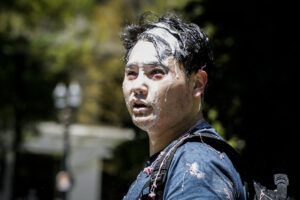
Andy Ngo after unidentified Rose City Antifa members attacked him. (Photo by Moriah Ratner/Getty Images)
One of the most surprising bits of news from a lawsuit that the owner of Portland, Oregon, bar Cider Riot filed in May against the far-right organization Patriot Prayer is that video footage submitted as evidence seems to have led to a fall from grace for Andy Ngo, a writer who had been a rising star in conservative media.
However, a bigger question than why Ngo left his editorial position at online right-wing magazine Quillette is how he managed to rise to the heights he did in the first place. It’s an uncomfortable question for journalism, but still necessary to ask because the truth is, Andy Ngo is journalism’s problem.

Take Control Of Your Firm’s Finances With Tools Built For Success
Position your firm for long-term growth with better financial visibility and control. Learn how to track performance, manage spending, and plan strategically—download the full e-book now.
Ngo raised eyebrows on Aug. 26, when he quietly removed Quillette’s name from his Twitter profile, and the magazine removed him from its masthead. Earlier that day, the Portland Mercury published an article about a pseudonymous left-wing activist who had infiltrated Patriot Prayer and filmed the group allegedly plotting a violent May 1 attack on Cider Riot, a popular leftist hangout. The video appears to show Ngo standing well within earshot of the conversation — the activist claims he overheard everything — but he didn’t include it in subsequent reports. That confirmed in the minds of his critics a longstanding suspicion that he was simply a far-right propagandist posing as a journalist.
Ngo has denied that he had knowledge of the alleged plot. Quillette editor Claire Lehmann tweeted that he had actually left the magazine already and had been off since July due to a brain hemorrhage sustained in a now infamous incident when several Antifas beat him in late June. Both have explicitly denied that Ngo’s leaving the publication was related to the video.
Still, given the timing of Ngo’s exit and the awkward way it became public, as well as his history of credibility issues, I can’t help feeling a tad skeptical. But regardless of the circumstances of his exit from the magazine, I don’t think Ngo could have gotten as far as he did were it not for a confluence of factors in politics and media in the past few years.
Those factors should be familiar. A hyperpartisan political climate. Public cynicism toward legacy news media and a perceived porousness in the relationship between reporting, analysis and opinion. The growing role of social media and crowdfunding in the dissemination of content, often with no editorial oversight. The internet’s erosion of journalism’s traditional structural barriers to entry.

How MyCase Accounting Transforms Legal Bookkeeping
This complete system built for lawyers simplifies the complex world of law firm finance.
Combine those elements, and you have the perfect primordial soup to give birth to a new kind of perfidious pseudo-journalist. WikiLeaks founder Julian Assange could be considered a prototype, but Ngo is a more refined version, born of the social media age. There will undoubtedly be more like him, and it’s imperative for those of us who value journalism’s critical role in democracy to be on guard.
Miscreants and pretenders exist in every profession. Law has its pettifoggers, medicine its quacks. But Ngo is something distinct from journalism’s occasional plagiarists and fabricators. Strictly speaking, he’s a propagandist who selectively presents facts to push political narratives, but he puts on the airs of a disinterested, objective reporter.
Of course, it’s not as though Ngo’s propagandist role or credibility issues were secrets. In 2017, the student newspaper he worked for, Portland State University’s The Vanguard, fired him over a tweet that paraphrased remarks by a Muslim student in a panel discussion in a way that the newspaper said took them out of context and put the student in danger. Instead of the soul searching any responsible journalist would do, Ngo took his story to the National Review, claiming he was “fired for reporting the truth” — a claim the newspaper challenged, but that helped make him famous. In August 2018, The Wall Street Journal had to issue a correction on his op-ed about Muslim neighborhoods in London when he suggested a sign reading “alcohol-restricted zone” was due to sharia law rather than being about public drinking — something any reporter could have discovered simply by asking someone on the street. And critics have long complained that he presents videos of brawling between far-left and far-right groups in a selective way that plays up violence by the former and downplays violence by the latter – most recently when he described the clash that took place in Portland on Aug. 17. Left-wing anger at Ngo boiled over in the aforementioned June attack on Ngo, which earned him support and sympathy from figures in news media and politicians.
I should state that I deplore political violence without reservation, including the attack on Ngo. That said, it’s apparent he’s been using his injury as a ploy for attention and to position himself as a go-to expert on left-wing lawlessness. And I’m not the first person to observe that he has carved out a media career that drapes a veneer of journalism over a mix of propaganda and professional victimhood. But one of the rules of journalism is that you’re not supposed to make yourself part of the story. So any self-styled independent journalist who goes out of their way to do so should arouse suspicion and is likely in this business for the wrong reasons. Ngo’s obvious desire for attention and problems with credibility should have been red flags from the start. And to be fair, many journalists weren’t fooled.
Unfortunately, however, many other journalists were, most importantly those in positions of power and influence. They helped elevate someone who should have been unceremoniously told to find another line of work a long time ago. That happened because he told stories that fit popular narratives of an intolerant, violent left and Islam’s existential threat to the West— and all from the beguilingly compelling perspective of the openly gay son of Vietnamese refugees. I’m sure his perpetual sad puppy demeanor, dispassionate vocal delivery, and phony English accent helped too.
In the days when journalism was limited to paper and airwaves, the need to go through established outlets served a function akin to the licensure that people must obtain to practice in professions like medicine and law. As the internet, social media and crowdfunding have removed those barriers to entry, for many people a “journalist” is now almost anyone who claims to be one — a view summed up in a July 2 defense of Ngo by New York-based YouTuber Alec Bostwick. While such a democratization of the profession may seem like a good thing, it also opens the door to a lot of unscrupulous types.
Journalism’s lack of a formal system of licensure is a feature rather than a bug and certainly not a bad thing it itself, as licensing journalists is generally something one finds in authoritarian states. While that’s great from a civil liberties standpoint, the downside is that it makes it a lot harder to protect journalism from those who misuse and abuse it.
What we can — and indeed must — do as a profession is keep our eyes out for bad-faith actors and not extend them professional respectability they don’t deserve. In other words, while the First Amendment’s freedom of the press applies to all, being accepted as a journalist should be a privilege rather than a right.
Alaric DeArment is a New York-based reporter at a sister publication of Above The Law. The opinions herein are entirely his own.